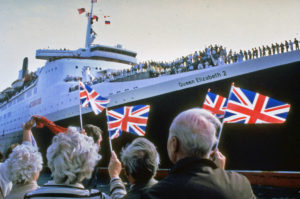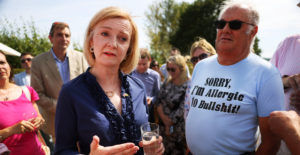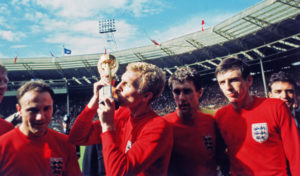It is difficult to imagine Ralph Waldo Emerson enjoying the World Cup. As the champion of the Transcendentalist movement, the sage of Concord was the embodiment of 19th-century high-mindedness, far more comfortable discussing the beauties of nature and the oneness of all things than Harry Kane’s glass ankle or Harry Maguire’s enormous head.
“All life is an experiment,” Emerson proclaimed. “The more experiments you make the better.” Is there a lesson there for Gareth Southgate? Or should the England boss stick with the tried and trusted, and resort to his usual back five against the bigger teams? Perhaps the only answer is to trust his own judgement. For “nothing,” Emerson also said, “can bring you peace but the triumph of principles.”
I’m pretty confident that nobody else has ever kicked off a preview of an England World Cup game with Ralph Waldo Emerson, but that’s just because we don’t often play the United States. There may have been a match in 2010, but it was so drab that I’ve long since forgotten it; and obviously World Cups before 1966 don’t count.
But as the hours tick down until tonight’s clash with the USA, Emerson’s legacy still looms large. For more than anybody else in his country’s history, it was the comically named Waldo who insisted that his countrymen emerge from the shadow of the Old World and create their own distinct identity, not simply as traitors and tax dodgers, but as unrepentantly non-British Americans.
The occasion was a speech to Harvard’s Phi Beta Kappa Society on 31 August 1837, entitled “The American Scholar”. And as Waldo told his listeners, it was time to throw off the shackles of the past. In future, Americans must take their cue from the natural wonders of their vast continent, not the dry, desiccated clichés they found in European libraries. The true American, Waldo said, should rely on himself: to stand tall, he must stand alone. “We will walk on our own feet,” he said grandly: “we will work with our own hands; we will speak our own minds.” Some inspiring words there, perhaps, for the catchily named USMNT.
Throwing off the Old World has been an American preoccupation from the very beginning. The first pilgrims sailed west to escape what they saw as the sinful corruption of James I’s England, and you need only glance at the world’s worst newspaper to see that their descendants’ obsession with English wickedness is as fervent as ever. Even though more than two centuries have passed since the American colonists put financial self-interest above their duty to king and country, you can still detect traces of the old resentments.
You can see them in the frequent laments that Hollywood studios are employing too many British actors — even black British actors. You can see them in, say, the New York Times’s coverage of London’s restaurant scene (“Beyond Porridge and Boiled Mutton”). You can see it, too, in the same paper’s complaints that too many “Britishisms” are entering American English: “Crikey, Britishisms are everywhere. Call it Anglocreep. Call it annoying.” They’re calling us annoying? Seriously?
Even on the football pitch — sorry, “soccer field” — many Americans will tell you that this fixture matters more than any other. “For any American player, this matchup is unique,” the former US World Cup striker Eric Wynalda wrote a few days ago. “While playing Brazil and Argentina is how you measure yourself as a country, playing England always feels personal.” When he played England in 1993, there was, he recalled, “an element of jealousy. The England players were rich, they had a big league and great fan support. They were cocky as hell. We wanted to be them, but in our own way. I think that still exists.” As it happens, Wynalda and co. won that day. Still, it was only a friendly.
Alas, in recent years, as even the most John Bullish have to admit, there haven’t been many cultural arenas in which we can feel smugly superior to our American cousins. Ever since the United States overtook Britain economically at the end of the 19th century — an inevitability given their geographical advantages, so that doesn’t really count as a win either — the boot has been firmly on the other foot. As early as 1914 the young T. S. Eliot, speaking in a debate at Merton College, Oxford, reminded his listeners “how much they owed to Amurrican culcher in the drayma (including the movies) in music, in the cocktail, and in the dance”. (These are Eliot’s own spellings. Again, they call us annoying?)
But it was in the decade after the First World War that the threat of Americanisation really loomed large. Britain was a country in shell shock: grey, weary, disillusioned and divided. The United States, on the other hand, was the land of ragtime and jazz, fizzing with excitement. “I am counting the days till I can get away and have decided from now on to live in America,” wrote P. G. Wodehouse in 1923. There was, he said, something “dead and depressing about London… all I want to do is to get back and hear the American language again.”
Wodehouse was bound for Hollywood, which was no accident. With a far bigger domestic market, an American film in the early Twenties typically made ten times more money than its British equivalent, which inevitably meant larger budgets. Even in 1925, some 95% of all film tickets sold in Britain were for American pictures.
And when, two years later, Al Jolson’s film The Jazz Singer ushered in the age of the talkies, Fleet Street’s finest wailed in despair. The terrible truth, lamented the Daily Express, was that “the bulk of our picture-goers are Americanised to an extent that makes them regard a British film as a foreign film… They go to see American stars; they have been brought up on American publicity. They talk America, think America, and dream America. We have several million people, mostly women, who, to all intent and purpose, are temporary American citizens.”
In the decades that followed, the traffic flowed only one way. When the United States entered the Second World War in December 1941 — two years late, as true patriots will never tire of pointing out — it rapidly became the senior Allied partner. Sent to North Africa to liaise with General Eisenhower, the young Harold Macmillan predicted that his compatriots’ future lay in being “Greeks in this American empire”, and hoped they might be able to mastermind things from the shadows, “as the Greeks ran the operations of the Emperor Claudius”. The Greeks in question were slaves, so this wasn’t a very enticing analogy. In any case, the Americans had no intention of allowing their former masters to “run” them. Britain would learn that lesson at Suez.
By the time Macmillan became prime minister in January 1957, Americanisation seemed unstoppable, epitomised by everything from Bill Haley and Elvis Presley to hamburgers and teenagers. When you read one contemporary list of outlandish Americanisms — “barbecued chickens rotating on their spits in the shop windows… parking meters… bowling alleys, glass-skyscrapers, flying saucers” — the surprising thing is that so many of them were American. Perhaps that tells its own story. “I must say,” muses Jimmy Porter in John Osborne’s play Look Back in Anger, “it’s pretty dreary living in the American Age — unless you’re an American of course. Perhaps all our children will be Americans.”
Then came a genuine turning point. Before 7 February 1964, the date the Beatles landed in New York, only two other British acts, Acker Bilk and the Tornados, had held the Billboard number one spot, both with instrumentals. But with their appearance on the Ed Sullivan Show, the picture changed.
In the next two years, British acts hogged the top spot for no fewer than 52 weeks, from Manfred Mann, Petula Clark and the Dave Clark Five to Herman’s Hermits, the Troggs and the Rolling Stones. The obvious irony is that they often played American music. But that didn’t make them any less British. “What made us first want to go to America and conquer it was being English,” the Who’s Pete Townshend said later. “We didn’t care a monkey’s about the American dream.”
For the next 40 years or so, the cultural relationship felt like a genuine joint enterprise. Sheer size meant the United States was always the bigger partner, but there were enough British Oscar winners, enough British number ones, to suggest that it wasn’t entirely one-way. At the height of the so-called Second British Invasion, between 1983 and 1986, British acts actually did even better than 20 years earlier, twice accounting for exactly half of all the places in the Top 40.
Even politically, British politicians could pretend, at least, that they stood as tall as their American contemporaries. Just read the hilarious transcript of Margaret Thatcher’s exchange with Ronald Reagan after British troops had landed on the Falkland Islands. Reagan suggests offering a ceasefire; she is having none of it. As the exchange goes on, Reagan’s contributions dwindle to “Margaret, I –” and ‘Yes, well —”, while hers get ever longer and more hectoring. True, he got his own back in Grenada a year later. But in Britain we’ve all forgotten about that, so again it doesn’t count.
Since then, however, there’s been a seismic technological shift, greater even than the rise of the cinema. And although we don’t really talk about Americanisation anymore, that’s surely because, since the rise of social media, we’ve become so Americanised that we no longer even notice it. Yet once you do start to notice it, you never stop. And yes, there’s a risk of sounding like the reincarnation of Lord Salisbury, but who cares?
So here we go. When did self-hating Britons start saying “mac ‘n’ cheese” instead of “macaroni cheese”? Why do 25-year-old publishers think “cliché” is an adjective? Why are there no medical systems on earth other than our beloved, sacred NHS and the cruel American private healthcare firms? Why does the BBC send 6,000 people to report on a senatorial election in Georgia but only two men and a dog to cover the federal elections in Germany?
Who decided that schoolchildren in Leamington Spa should care about Rosa Parks? Why did thousands of people take to the streets in Britain about the killing of a single black man in Minneapolis, when barely a handful bother to protest the sack of Mariupol or the incarceration of the Uyghurs? And why on earth, when a couple of half-crazed American academics announce that we must cancel the term Anglo-Saxon to describe Alfred the Great and Athelstan because it’s a racist “dog whistle” for “white, Western superiority”, do so many British historians fall limply into line?
There’s only one answer to all this — and in an age that prizes victimhood above all else, what a richly satisfying answer it is. For it’s time we Britons recognised ourselves for what we are: a cruelly oppressed people, so brutalised by our imperial overlords that we don’t realise how badly we’ve been treated. Our idioms, our customs, even our cooking have been ruthlessly erased from history, our pies and puddings driven out by chicken wings and cheeseburgers, and we haven’t even noticed. And now they’re even coming for our ancestors, the Anglo-Saxons of sainted memory!
So what would Athelstan, the first king of all England, say? I think we all know the answer to that. He’d say: “Lads, it’s time to decolonise ourselves. Who cares what the Yanks think? But first things first: the World Cup. Let’s give them such a beating they never again claim that macaroni cheese is three words. Come on, England!”
And he would, of course, be right.
Disclaimer
Some of the posts we share are controversial and we do not necessarily agree with them in the whole extend. Sometimes we agree with the content or part of it but we do not agree with the narration or language. Nevertheless we find them somehow interesting, valuable and/or informative or we share them, because we strongly believe in freedom of speech, free press and journalism. We strongly encourage you to have a critical approach to all the content, do your own research and analysis to build your own opinion.
We would be glad to have your feedback.
Source: UnHerd Read the original article here: https://unherd.com/






